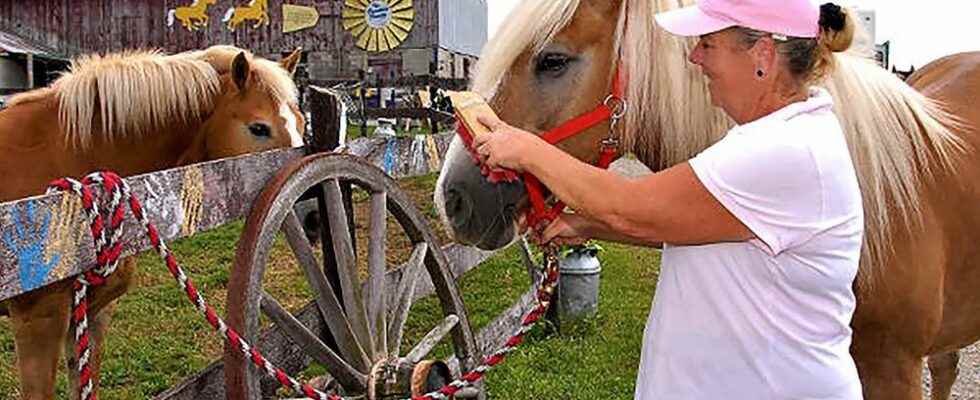
Kelly Tallon Franklin’s mission to help victims of human trafficking has earned her provincial recognition.
This advertisement has not loaded yet, but your article continues below.
The founder of Courage for Freedom, a charity with a Chatham location that focuses on caring for victims and increasing awareness about human trafficking, was named a recipient of the June Callwood Outstanding Achievement Award for Voluntarism.
“I wasn’t going to accept it,” Franklin said with a laugh. “It was a little intimidating because I know who June Callwood is and I have the utmost respect for her over my lifetime.”
Still, Franklin accepted the award for “the benefit of everybody that we have had the privilege to amplify their voices, their needs and to journey together.”
She also accepted the recognition to celebrate the “tireless volunteers,” allies and everyone who has stood with Courage for Freedom for the work that’s been done and to champion what the organize represents.
Franklin and a 16-year-old human trafficking victim were the driving force behind #ProjectONRoute, which raised awareness about the Highway 401 corridor being a hotbed for human trafficking. The movement has since gone national with #ProjectMapleLeaf.
Courage for Freedom started in 2007 on a farm near London that offered programming for kids struggling to find a good fit elsewhere. From 2011 to 2013, Franklin said volunteers started seeing an escalation of cases of self-harm, mental-health issues, suicidal thoughts and kids running away.
Working with current St. Thomas mayor and former Elgin–Middlesex–London MP Joe Preston, who was chair of the board, the organization began making the transition to providing expert professional training work and full-time support to human-trafficking victims.
This advertisement has not loaded yet, but your article continues below.
The organization expanded to Chatham in late 2019 to be more central for work also being done in Windsor and Sarnia.
Courage for Freedom has now worked with roughly 475 young people who have been victims of human trafficking and sexual exploitation and their families.
Franklin has a keen insight into what these victims are experiencing.
“I’m actually a survivor of human trafficking from the ’80s,” she said.
Franklin remembered knowing Kelly Mombourquette, a young woman whose body was found in northeast Toronto on Oct. 19, 1987.
The news media at the time referred to the teen as a prostitute, Franklin recalled, because “there was not very much understanding of human trafficking, coercion and the institutional oppression and barriers to choices, especially women and girls.”
She said those seen as choosing prostitution were seen as the “lowest of the low.”
More than 40 years later, Franklin knows recovering from human trafficking can take many years.
Even with her 60th birthday approaching, Franklin said she still deals with post-traumatic stress disorder and abuse trauma every day.
“I have to be tactical and intentional about it,” Franklin said. “I need to do my self-care and I need to understand it frames my thinking and my talking and how I treat my body and how I treat people around me.”
She said it can take years for a victim to be able to properly communicate the trauma they endured.
Describing it as a brain trauma, Frankin said victims often can’t immediately tell their stories because “there’s actually neural pathways that are damaged through the trauma cycles.”
This advertisement has not loaded yet, but your article continues below.
“It’s actually a safeguard and then we blame survivors when they can’t remember,” she said.
While it can take months and years to help a human-trafficking victim heal, Courage for Freedom is deliberately not government funded, she said.
“The reason we’re not is we continue to use our advocate’s voice to speak to issues that, if we were funded, we might not be able to include a truly representational narrative.”
To help in the healing process, the charitable organization runs the Horses that Heal program. Franklin said these sessions help women and girls “reacquaint themselves with their feelings to get their trauma brain first quiet, then operational.”
She said the ability to start to heal from the shame sometimes starts when they go to a barn and put their hands on the side of a horse and feel it breathe.
“When we just slow it down and are present and are grounded … that transcends inside the barns,” Franklin said.
When it comes to human trafficking, she knows many people are at different places in their understanding.
She just asks people make the call if they suspect someone is a victim. This can be done by calling 911 or the Canadian Human Trafficking Hotline at 1-833-900-1010. More details are available on the Courage for Freedom Facebook page or online at www.courageforfreedom.org.
Franklin said she has seen a “ton” of success stories over the years. She challenges Chatham-Kent to donate to help continue this work.
“And you know what, any that isn’t there yet, is a work in progress, just like I am,” she said.
